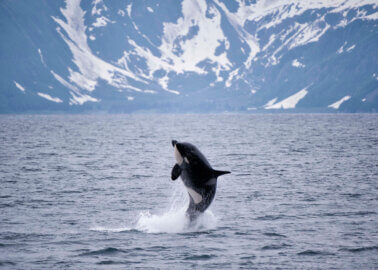Former SeaWorld Senior Orca Trainer Reveals the Terrible Toll Marine Parks Take on Animals
Former SeaWorld senior orca trainer John Hargrove reveals the terrible toll marine parks take on animals and why tourists must stop visiting them.
By John Hargrove
Imagine spending your entire life trapped in a small enclosure. Physical and psychological damage endured by human prisoners in solitary confinement is well documented. Orcas at amusement parks such as SeaWorld suffer the same fate. I can tell you from my 14 years of experience that I personally witnessed the orcas – as well as other dolphins and marine animals – suffer the same physical and psychological trauma. But the power to shut down these cruel parks does exist, and it lies in every visitor’s hands.
 © Melissa Hargrove
© Melissa Hargrove
February 24 marked 12 years since my friend and colleague Dawn Brancheau was violently killed at SeaWorld. Tilikum, the orca responsible, had previously killed two other people, but he is not the villain in this story. He’s also not the only orca at SeaWorld to kill a trainer. We had countless serious injuries and near fatalities during my career, caused by many different orcas. Confinement causes not only chronic health issues but also extreme stress that leads to violent behaviour and deadly attacks. This is not just my opinion, it is a quantifiable fact. We could determine the levels of stress in their blood, which is why countless orcas were medicated.
 © Melissa Hargrove
© Melissa Hargrove
Tilikum was only about 2 years old when his freedom was stolen and he was torn away from his family and home in the ocean in 1983. He would never see his family, feel seawater on his skin, or experience freedom again. He was sold to the highest bidder and placed in grotesquely small tanks where he could do little else but swim in endless circles as he was largely ignored. The confinement made him lash out in frustration. He died in his watery prison cell in 2017 – having spent more than three decades deprived of any semblance of a natural life.
He isn’t the only animal to have died at SeaWorld. More than 40 orcas and over 300 other dolphins and whales have died from causes such as pneumonia, infections, traumatic injuries, encephalitis, and other ailments caused by extreme confinement (or confinement in captivity.) Heart failure, intestinal gangrene, and broken teeth – from chewing on the ledges of their concrete enclosures and slamming their heads against massive steel gates – are also common. These businesses have well-funded, savvy marketing teams to try and hoodwink the public into believing these captive animals are happy. Some visitors, who wouldn’t dream of going to an animal circus, don’t think twice before paying to see orcas and other dolphins performing tricks. Yet marine animals have the same right to freedom, to live without suffering, as a lion or a human. They are not circus acts.
 © Melissa Hargrove
© Melissa Hargrove
I’ve heard visitors say, “Look, he’s smiling,” when they see the orcas and other dolphins at marine parks. They are not. This is only an illusion arising from the configuration of their jaws that makes people believe, wrongly, that the animals are content. In reality, they lead lives of quiet desperation. More than a decade of loving and building strong relationships with 20 different orcas and other marine mammals showed me this was simply not right. It opened my eyes to the horrors of their lives in captivity and led me to accept that my love for them could not change that. I resigned from my top-ranking senior trainer position so I could speak publicly to expose what truly happens to these animals in captivity – the only way to bring about change. The harsh reality is that they are exploited by a billion-dollar industry built on animal suffering.

In the wild, orcas can easily swim over 100 miles a day. The distance they can swim in parks’ concrete tanks is thousands of times shorter than that. Orcas are huge marine animals completely unsuited to captivity, and all captive orcas have died prematurely. They should be left alone and be able to live meaningful lives in their large family groups with their own culture, where they build complex relationships with each other, form deep bonds, and use their sophisticated problem-solving and communication skills to stimulate and enrich their lives. No watery prison can replicate that.
Confined in shallow, barren tanks with little physical, psychological, or emotional stimulation, the intelligent, sensitive animals in these parks become distressed and ill. Their babies and other family members have often been torn from them to be shipped to other parks. Frustrated, confused, unable to choose their own companions or swim free, they can easily turn violent, attacking other animals or severely injuring or killing their trainers, as we saw with Dawn and others. It’s a product of the stress and trauma they endure in this cruel, corporate money-making scheme disguised as entertainment.
Many visitors – unaware that their cash is paying for this cruelty to continue – are tourists who go to SeaWorld as part of their package holidays. While British Airways Holidays, Virgin Holidays, Tripadvisor, Expedia, AirBnB, and Booking.com have cut ties with SeaWorld and similar parks, following pressure from animal rights group PETA, travel firm TUI still sells tickets to these shows, despite being made fully aware of the cruelty.
It is, of course, time – past time – for TUI and any other travel provider still giving a financial lifeline to parks which hold orcas, other dolphins, or other marine mammals captive to stop – now. And if you’re visiting a country where these shows are on offer, vote with your wallet by staying away.
PETA calls them “abusement” parks. When animals are suffering, that is abuse. Animals at SeaWorld and other marine parks should be moved to coastal sanctuaries where they can live out the rest of their lives in peace, and these watery prisons should be closed forever. I am hopeful that very soon, we will see one of these parks make the right decision and do just that. In doing so, it will set an unprecedented example for all other parks to follow.
John Hargrove is a former SeaWorld Senior Trainer and author of New York Times Best-Seller ‘Beneath the Surface’.
What You Can Do for Orcas in Captivity
If you haven’t already done so, please contact TUI and urge it to stop selling tickets to SeaWorld and other facilities that hold orcas captive for human amusement.



